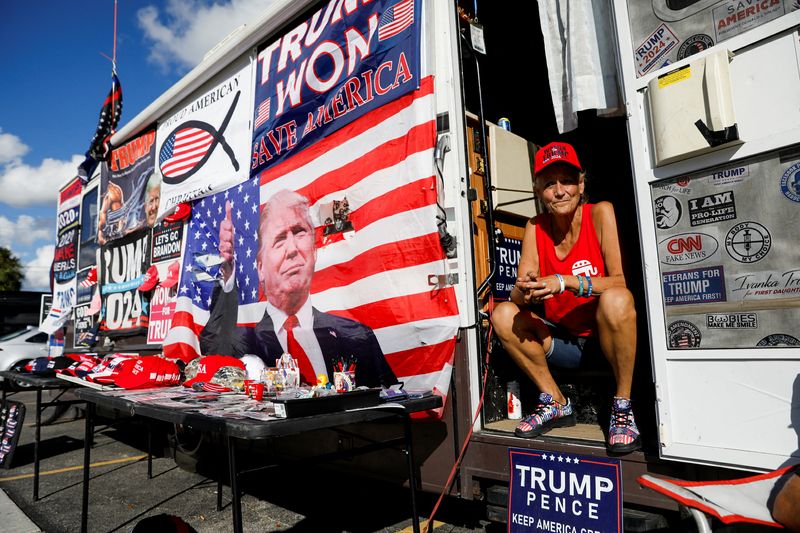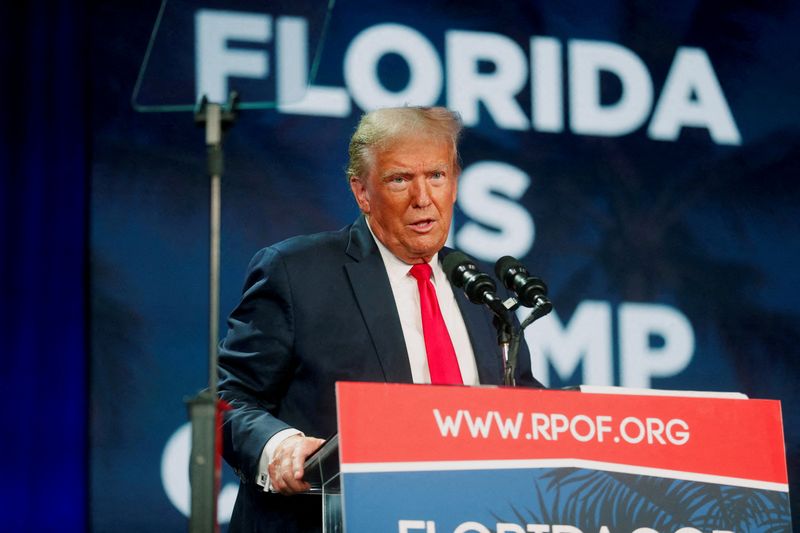By Nathan Layne and James Oliphant
HIALEAH, Florida (Reuters) -Donald Trump, the frontrunner for the Republican presidential nomination, likened the criminal cases against him to political prosecutions in Cuba and other repressive nations as he sought to court Hispanic voters at a rally in Florida on Wednesday.
Trump, who is defending himself in four criminal and at least three civil trials, made the comments in the heavily Hispanic city of Hialeah, as his party rivals debated again without him just a short drive away in Miami.
Trump's claims, however unsubstantiated, appear to be helping boost his standing with Hispanic voters, many of whom fled repressive regimes in Cuba, Nicaragua and Venezuela. The Trump campaign views Hispanics, the fastest-growing ethnic and racial group in the U.S. electorate, as a key demographic for gains in a likely rematch with Democrat Joe Biden in 2024.
"Just like the Cuban regime, the Biden regime is trying to put their political opponent in jail," Trump said to thousands of supporters assembled in a local sports stadium. "We are not the ones endangering American democracy, we are the ones saving American democracy."
Trump made no mention of victories by abortion rights campaigners and Democrats in U.S. elections a day earlier. The Supreme Court's conservative majority, secured via the nominations of justices by Trump, overturned the nationwide right to abortion last year.
Miami-Dade is Florida's most populous county and home to 1.5 million Latinos of voting age. Democrat Hillary Clinton carried the county over Trump by nearly 30 percentage points in 2016. Trump cut that margin to 7 percentage points against Biden in 2020.
Florida governor Ron DeSantis won the county outright in his re-election campaign for governor in 2022, winning 65% of the Hispanic vote in a landslide victory that suggested a massive shift toward the Republicans in just six years.
Now Trump is banking on Hispanic voters to help him defeat DeSantis, who is a distant second in polls in the Republican nominating contest, while looking to lock in their support for a likely general election rematch with Biden in November 2024.
"In any other circumstance if Donald Trump wasn't a candidate I think I would be fully in the DeSantis camp," Hialeah mayor Esteban Bovo told Reuters, adding that he would be asking the city council to rename a street after Trump. "But to me, on this one, it's kind of wait your turn, I guess."
Trump's efforts with Hispanic voters are part of a broader attempt to expand his base built on white, rural voters. In addition to the party's gains with the Hispanic community, opinion polls released this week by The New York Times and Siena College show that 22% of Black voters in six hotly-contested states support Trump, a level not secured by a Republican presidential candidate in modern times.
In a Reuters/Ipsos poll in September 38% of Hispanic respondents said they would vote for Biden, while 36% picked Trump. That would appear to be a troubling trend for Biden, who beat Trump by about 20 points among Hispanic voters in 2020, according to an analysis of exit poll data by Pew Research.

The Biden campaign isn't sitting on its hands. It views Hispanic, Black and young voters as critical to its chances in 2024 and has started to ramp up spending on Spanish-language ads, among other measures targeting swing states.
But campaign advisers are also aware that Florida, which was once a battleground but is now solidly Republican, will be tough for Biden to capture, regardless of how he fares with Hispanic voters.
